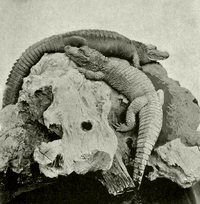
Photo from wikipedia
Environmental estrogens pose serious concerns for ecosystems through their effects on organismal survival and physiology. The gut microbiome is highly vulnerable to environmental influence, yet the effects of estrogens on… Click to show full abstract
Environmental estrogens pose serious concerns for ecosystems through their effects on organismal survival and physiology. The gut microbiome is highly vulnerable to environmental influence, yet the effects of estrogens on gut homeostasis are unknown because they are poorly studied in wildlife populations. To determine the influence of environmental estrogens (i.e., xenoestrogens) on the diversity and abundance of gut microbiota, we randomly assigned 23 hatchling American alligators (Alligator mississippiensis) to three ecologically relevant treatments (control, low, and high estrogen concentrations) for ten weeks. We predicted that xenoestrogen exposure would decrease microbial diversity and abundance within the digestive tract and that this effect would be dose-dependent. Microbial samples were collected following diet treatments and microbial diversity was determined using 16S rRNA gene-sequencing. Individuals in estrogen-treatment groups had decreased microbial diversity, but a greater relative abundance of operational taxonomic units than those in the control group. Additionally, this effect was dose-dependent; as individuals were exposed to more estrogen, their microbiota became less diverse, less rich, and less even. Findings from this study suggest that estrogen contamination can influence wildlife populations at the internal microbial-level, which may lead to future deleterious health effects.
Journal Title: Environmental microbiology
Year Published: 2022
Link to full text (if available)
Share on Social Media: Sign Up to like & get
recommendations!